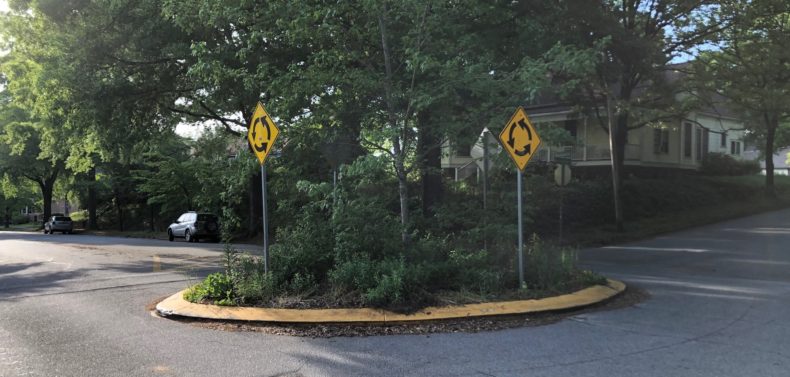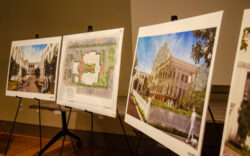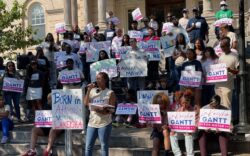Ask any Athens-Clarke County commissioner, and they’ll probably tell you one of the most common complaints they receive is people driving too fast through their neighborhoods. The commission is now considering changes to the way the county decides where to install traffic-calming measures like speed humps that force drivers to slow down.
“We’ve made some major improvements as far as making it easier for a community to be reviewed,” said Commissioner Allison Wright, who chairs the Legislative Review Committee that wrote the legislation.
Commissioners have long struggled with how to set criteria for and prioritize traffic-calming projects on residential streets objectively. This has led to some frustration in the past, with some residents—and commissioners—wondering why other neighborhoods make the cut and theirs don’t.
The solution, after nearly a year’s worth of discussion on the LRC, is to lower the criteria for consideration while also adding some subjective elements. Under the proposed rules, thresholds will be lowered from 500 vehicles per day to 300, and an 85th percentile speed of 30 miles per hour, rather than 32.5 (meaning 15% of drivers travel faster than 30 mph). In addition, traffic engineers could consider the width of the street, a lack of sidewalks, how close houses are to the road, the amount of cut-through traffic and proximity to schools.
For consideration, 65% of all owner-occupied homeowners, renters and absentee landlords in the district must agree to any changes. As the program mainly benefits those who live on the street, residents are required to fund up to half the cost.
The proposed changes will especially help low-income and largely rental neighborhoods that are often marginalized, Commissioner Melissa Link said. “Those neighborhoods have really been underserved by this traffic management program,” she said.
Commissioner Tim Denson said several neighborhoods in his northwest Athens district have been trying to opt into the program. “Sometimes there were obvious problems happening with neighborhood traffic, but those very specific criteria didn’t tick all the boxes,” he said.
The commission is scheduled to vote on the proposal at its May 4 voting meeting.
Also briefly discussed at the Apr. 20 meeting: An abandoned effort to build a mobile home park in northeastern Athens for displaced local residents has found new life as a religious organization’s community serving “at-risk” mothers and children.
A 17-acre parcel off Freeman Drive was once slated to become a new home for People of Hope, a group of primarily Hispanic immigrants who lived in a mobile home park that was sold for new development in 2002. The project for 41 mobile homes and a community center was approved by the county in 2005, but other than some grading and infrastructure work, it stalled out due to lack of funding despite several six-figure grants and loans, at least one of which the U.S. Department of Housing and Urban Development eventually clawed back due to missed deadlines. “Ultimately this project never came to fruition, and it’s sat idle since then,” Planning Director Brad Griffin said.
Tax records show that People of Hope gave the land back to First American Bank and Trust in 2014 when it was about to be foreclosed on. A group called Hope 139 House then purchased it and now plans 12 cottages, a dormitory and a community room there.
“Hope 139 House, not affiliated with People of Hope, sees this project as an opportunity to restore the abandoned property and bring the site to life,” according to the group’s application to the ACC Planning Department. According to its website, the group is aligned with the Southern Baptist Convention but is open to all mothers who are expecting or have children less than 8 weeks old, while women with children over 8 weeks old are eligible for a “second chance house.” Its website states:
“Through providing housing, training and provisions in a Christ-centered environment, our goal is to set them on a path for a brighter future together as a family unit. We want to provide a loving home and support system for pregnant and parenting women of any situation or walk of life making decisions to give life outside the womb to their babies. Our training programs, in-house and partnerships, will prepare them for various aspects of life, giving them the parenting support they need to raise a child. We welcome mothers of any race or religion into our living spaces, showing them the love and grace of Christ as we work together to prepare them for a successful future with their child. We hope to lessen the strain on the foster care program through giving birth mothers the help and support needed to keep their children.”
The organization seems to bear a resemblance to “crisis pregnancy centers” like the church-funded Athens Pregnancy Center that proselytize to pregnant women under the guise of offering basic medical services, except with a residential component.
From a zoning perspective, the proposed development is less dense than the one People of Hope originally proposed, Griffin said. Hope 139 House is seeking a rezoning to multifamily residential, which is the same classification granted to People of Hope. However, in the interim, the property was down-zoned to a suburban residential designation after the commission decided not to run a sewer line along Sandy Creek because of environmental concerns.
Commissioner Ovita Thornton, who represents the Freeman Drive area, praised the development because it will include amenities like a basketball court and community center that will be open to all neighborhood residents. “Not only are they catering to their clientele, they’re opening their arms to the residents of this area who have often been overlooked,” she said.
Like what you just read? Support Flagpole by making a donation today. Every dollar you give helps fund our ongoing mission to provide Athens with quality, independent journalism.










